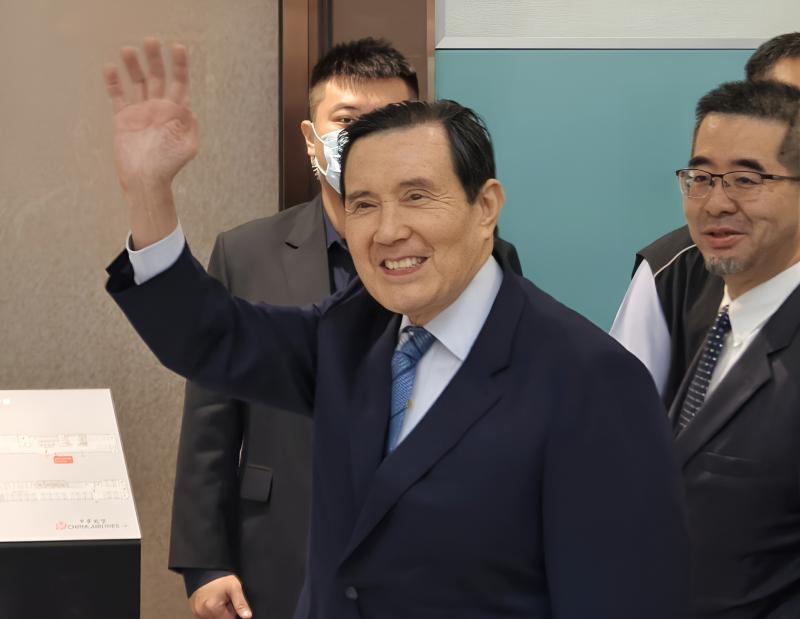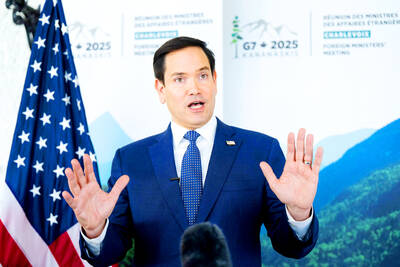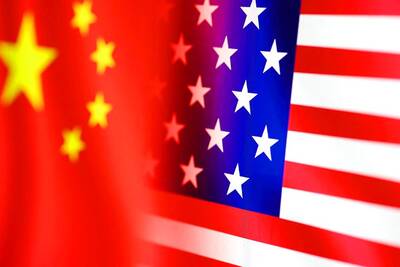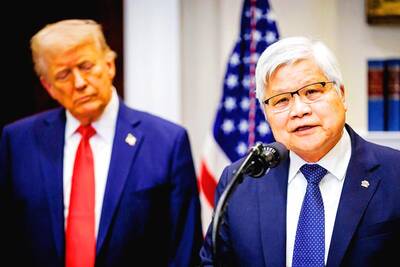Former president Ma Ying-jeou (馬英九) left on Monday for an 11-day trip to China, where sources said he is expected to meet with Chinese President Xi Jinping (習近平) on Monday next week.
Ma, president from 2008 to 2016, last year became the first former president to visit China.
Ma met Xi in Singapore in late 2015 for a landmark summit shortly before President Tsai Ing-wen (蔡英文) won election.

Photo: Yao Chieh-hsiu, Taipei Times
Ma and China's government have not confirmed the meeting with Xi, which has been widely reported in local media.
Three sources familiar with Ma's trip, speaking on condition of anonymity given the sensitivity of the issue, told Reuters it was expected to take place in Beijing on Monday next week.
"This is a trip of peace as well as of friendship," Ma told reporters in brief remarks at the airport before flying to Shenzhen in Guangdong Province.
Ma added that he hoped to convey a message that Taiwanese love peace and hope to avoid war.
China's Taiwan Affairs Office, which calls him "Mr Ma Ying-jeou" rather than former president, would only say last week when asked about a meeting with Xi that it wished Ma a smooth trip.
Ma's office said while in Guangdong he is to visit Chinese electric vehicle giant BYD and Tencent, the world's largest video game company and operator of China's WeChat messaging platform.

‘CROWN JEWEL’: Washington ‘can delay and deter’ Chinese President Xi Jinping’s plans for Taiwan, but it is ‘a very delicate situation there,’ the secretary of state said US President Donald Trump is opposed to any change to Taiwan’s “status quo” by force or extortion and would maintain that policy, US Secretary of State Marco Rubio told the Hugh Hewitt Show host on Wednesday. The US’ policy is to maintain Taiwan’s “status quo” and to oppose any changes in the situation by force or extortion, Rubio said. Hewitt asked Rubio about the significance of Trump earlier this month speaking with Taiwan Semiconductor Manufacturing Co (台積電) chairman C.C. Wei (魏哲家) at the White House, a meeting that Hewitt described as a “big deal.” Asked whether the meeting was an indication of the

‘RELATIVELY STRONG LANGUAGE’: An expert said the state department has not softened its language on China and was ‘probably a little more Taiwan supportive’ China’s latest drills near Taiwan on Monday were “brazen and irresponsible threats,” a US Department of State spokesperson said on Tuesday, while reiterating Washington’s decades-long support of Taipei. “China cannot credibly claim to be a ‘force for stability in a turbulent world’ while issuing brazen and irresponsible threats toward Taiwan,” the unnamed spokesperson said in an e-mailed response to media queries. Washington’s enduring commitment to Taiwan will continue as it has for 45 years and the US “will continue to support Taiwan in the face of China’s military, economic, informational and diplomatic pressure campaign,” the e-mail said. “Alongside our international partners, we firmly

KAOHSIUNG CEREMONY: The contract chipmaker is planning to build 5 fabs in the southern city to gradually expand its 2-nanometer chip capacity Taiwan Semiconductor Manufacturing Co (TSMC, 台積電), the world’s biggest contract chipmaker, yesterday confirmed that it plans to hold a ceremony on March 31 to unveil a capacity expansion plan for its most advanced 2-nanometer chips in Kaohsiung, demonstrating its commitment to further investment at home. The ceremony is to be hosted by TSMC cochief operating officer Y.P. Chyn (秦永沛). It did not disclose whether Premier Cho Jung-tai (卓榮泰) and high-ranking government officials would attend the ceremony. More details are to be released next week, it said. The chipmaker’s latest move came after its announcement earlier this month of an additional US$100 billion

Authorities yesterday elaborated on the rules governing Employment Gold Cards after a US cardholder was barred from entering Taiwan for six years after working without a permit during a 2023 visit. American YouTuber LeLe Farley was barred after already being approved for an Employment Gold Card, he said in a video published on his channel on Saturday. Farley, who has more than 420,000 subscribers on his YouTube channel, was approved for his Gold Card last month, but was told at a check-in counter at the Los Angeles International Airport that he could not enter Taiwan. That was because he previously participated in two